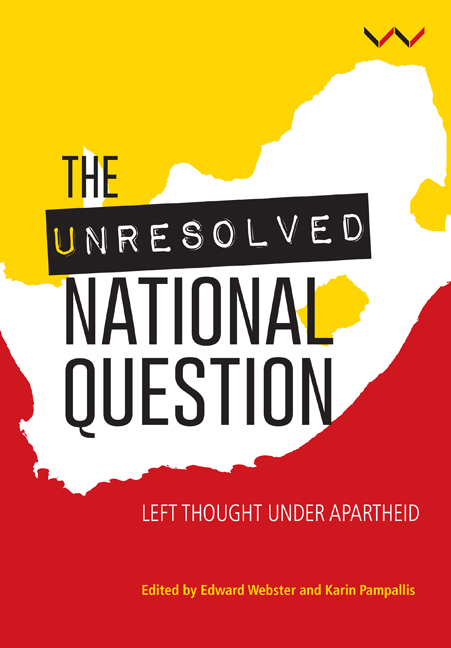Book contents
- Frontmatter
- Contents
- Acronyms and Abbreviations
- Preface: Edward Webster and Karin Pampallis
- Introduction: Revisiting the National Question
- PART ONE KEY FOUNDATIONAL TRADITIONS
- PART TWO CONTINUITY AND RUPTURE
- Chapter 6 Vicissitudes of the National Question: Afrikaner Style
- Chapter 7 Neville Alexander and the National Question
- Chapter 8 The Marxist Workers’ Tendency of the African National Congress
- Chapter 9 The National Question confronts the Ethnic Question
- Chapter 10 Variations on a Zulu Theme
- Chapter 11 Black Consciousness as Nationalism of a Special Type
- Chapter 12 Postponing the National Question: Feminism and the Women's Movement
- Chapter 13 Workerists and the National Question
- Chapter 14 Red, Black and Gold: FOSATU, South African ‘Workerism’, Syndicalism and the Nation
- Chapter 15 National Democratic Revolution meets Constitutional Democracy
- Biographical Notes
- Index
Chapter 14 - Red, Black and Gold: FOSATU, South African ‘Workerism’, Syndicalism and the Nation
from PART TWO - CONTINUITY AND RUPTURE
Published online by Cambridge University Press: 21 April 2018
- Frontmatter
- Contents
- Acronyms and Abbreviations
- Preface: Edward Webster and Karin Pampallis
- Introduction: Revisiting the National Question
- PART ONE KEY FOUNDATIONAL TRADITIONS
- PART TWO CONTINUITY AND RUPTURE
- Chapter 6 Vicissitudes of the National Question: Afrikaner Style
- Chapter 7 Neville Alexander and the National Question
- Chapter 8 The Marxist Workers’ Tendency of the African National Congress
- Chapter 9 The National Question confronts the Ethnic Question
- Chapter 10 Variations on a Zulu Theme
- Chapter 11 Black Consciousness as Nationalism of a Special Type
- Chapter 12 Postponing the National Question: Feminism and the Women's Movement
- Chapter 13 Workerists and the National Question
- Chapter 14 Red, Black and Gold: FOSATU, South African ‘Workerism’, Syndicalism and the Nation
- Chapter 15 National Democratic Revolution meets Constitutional Democracy
- Biographical Notes
- Index
Summary
You, moving forest of Africa.
When I arrived the children were all crying,
These were the workers, industrial workers …
Escape into that forest,
The black forest that the employers saw and ran for safety.
The workers saw it too
‘It belongs to us,’ they said,
‘Let us take refuge in it to be safe from our hunters.’
Deep into the forest they hid themselves and when
they came out they were free from fear …
Lead us FOSATU to where we are eager to go.
Even in parliament you shall be our representative.
Go and represent us because you are our Moses
Through your leadership we shall reach our Canaan …
(Alfred Qabula, ‘Praise Poem to FOSATU’, 1984)INTRODUCTION
After months of talks between unions associated with the Trade Union Advisory Coordinating Council (TUACC), the Federation of South African Trade Unions (FOSATU) was inaugurated on 13 April 1979. FOSATU was the first federation of predominantly unregistered trade unions with a truly national reach to operate openly in South Africa since the late 1960s.
FOSATU membership reached 140 000 in 1985 (Baskin, 1991: 49); it was ‘by far the strongest working-class organisation’ opposing apartheid in the early 1980s (Schroeder, 1988: 54). The largest strike wave since the 1940s took place in 1981, and FOSATU played an integral role (Yudelman, 1984: 271). FOSATU was also associated with the distinct radical politics of South African ‘workerism’, and had a mass base among black workers.
‘Workerism’ was widely identified as the dominant political current within FOSATU in the early 1980s (for example, Mahomed, 1984). Although workerism was not the only current in the federation, and was not restricted to FOSATU (Byrne, 2012), its core positions remain relatively unknown. This is partly because workerism was highly controversial at the time, the subject of fierce, often misleading polemics (for example, Toussaint, 1983; Comrades in Africa, 1984; Nhere, 1984; Nyawuza, 1985). Coupled with a lack of dedicated studies of FOSATU or its affiliates, this has left workerism's actual positions largely obscured from view.
- Type
- Chapter
- Information
- The Unresolved National Question in South AfricaLeft Thought Under Apartheid, pp. 254 - 273Publisher: Wits University PressPrint publication year: 2017



